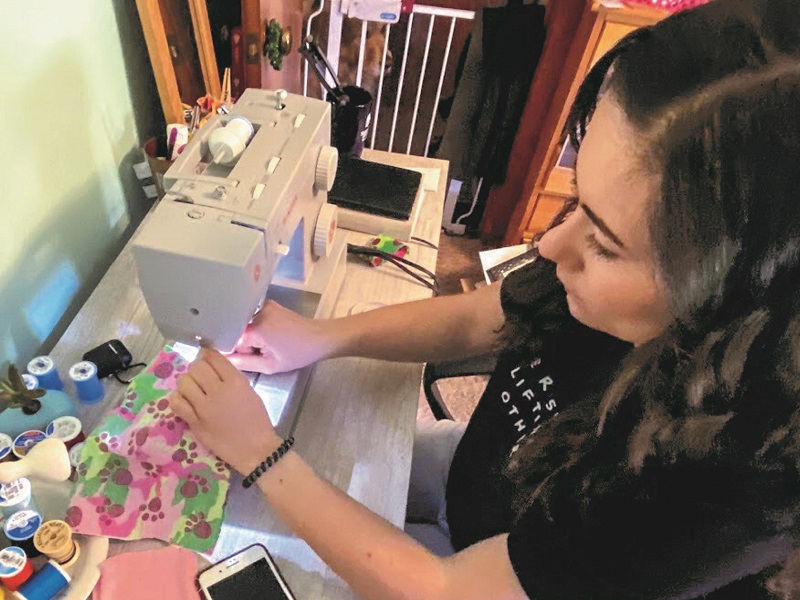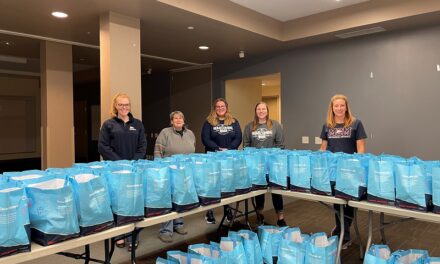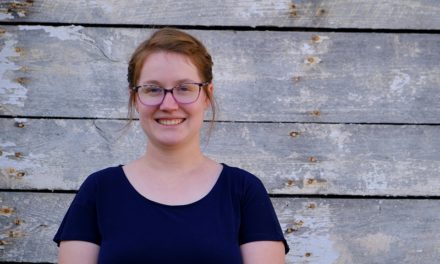No one wanted to figure out how to shift from in-person classes to remote education in two weeks, but COVID-19 didn’t provide another option. Like every college and university nationwide—really, worldwide—a global pandemic abruptly pushed Shippensburg University faculty, staff, and students into uncomfortable and unknown territory. With the state announcing new changes and restrictions seemingly by the minute, students left campus for spring break March 6 and returned to a much different scenario. It was time to pack up for the semester and finish classes through remote learning.
About two weeks before spring break, Justin Sentz, deputy chief information technology officer, and the IT team discussed the impact of the pandemic on the university and how they needed to prepare for the potential of moving online. All of a sudden it was reality—Zoom and D2L training with faculty, gathering technology and resources for students, and determining how to get staff the tools they needed for remote working.
Many long days and sleepless nights later, Sentz came up for air to reflect. “It went as well as it could,” he said. “Now, it’s about how to make every day a little better than the last.”
That was the unofficial mantra of the spring semester: make every day a little better than the last. Shippensburg University, much like the rest of the country, is a beautiful but barren campus this spring. But the life that drives campus is not gone—it’s simply shifted to a new space.
Students learned, researched, socialized, volunteered, and amazed. Faculty taught, mentored, cared, problem solved, and encouraged. Staff pivoted, worked, collaborated, supported, and accomplished.
No one wanted to figure this out. No one wanted the messy, abrupt good-byes mid-semester. But, every member of the university came together to make it happen.
TRADING SPACES
As the COVID-19 pandemic closed campuses nationwide, it opened up new opportunities for Ship to charge on with remote learning.
Students stayed positive about the transition to successfully complete the spring semester. “This was a difficult and unplanned occurrence to happen to all of us,” said Madison Raeburn, a first-year international business major from Phoenixville Area High School. Raeburn knew it was important to create a schedule early and check D2L frequently to stay focused during the semester.
For senior marketing major Gavin George, finding success this spring meant finding balance. “I plan to stay positive and successful by making a schedule, but also allowing time to relax and keep my mental health strong.”
Dreux Stamford, a graduate student in the organizational development and leadership program, said he missed many things about the Shippensburg community, such as engaging with other students during class and coaching the track and field team.
Despite these losses, Stamford recognized a brighter side to this new normal. “Online classes were slightly easier for me because it allowed me to choose when I got work done versus meeting every week at a specific time for a lecture. It obviously wasn’t as engaging as face-to-face courses, but the time we had to learn on our own, for me, made it easier.”
The adjustment has been challenging, said Dr. Matthew Shupp, associate professor for the Department of Counseling and College Student Personnel. But, he added, “I am continually impressed with our faculty’s ability to pivot—abruptly—and figure out the best ways to move student learning online with the least amount of disruption as possible.”
“We couldn’t predict at the beginning of the semester that these changes would be thrust upon us, or that we’d have about a week to feel as prepared as we possibly could to move forward,” Shupp said. Yet, faculty, students, and staff rallied together to make this an invaluable educational experience.
Dr. Lynn Baynum, associate professor of teacher education, worked hard to create a learning environment as interactive as in-person courses. She continued her discussions and group-based classes through special assignments for her students. “It is my hope that these ongoing interactions support students while they complete the assignments, but perhaps more importantly, provide them with an opportunity to remain part of a classroom community.”
Dr. Mohammad Rahman, associate professor of marketing, looked at the positive aspects of distance learning. “My approach was taking this new venture as a learning experience for students and myself,” he said. “There will be some mishaps and missed deadlines, but when we work together in these learning experiences, we learn as well as know that other students and faculty are going through the same experience as everyone.”
Ship’s IT Department played a crucial role in the transition to virtual courses by holding informative training sessions that helped integrate D2L and Zoom into professors’ daily instruction. Jamie Rhine, director of technology support services, was impressed by the faculty turnout for training sessions.
“Faculty from all levels—whether they were new with the technology or used it frequently—attended.
Those who were comfortable with the university’s online programs helped faculty who needed it,” he said.
The Career, Mentoring, and Professional Development Center also made a quick switch to virtual services, ensuring students didn’t miss a beat when preparing for internships or jobs. Fortunately, there are jobs available. Making connections now is key for students preparing to launch their careers in
the midst of a global pandemic, said Lorie Davis, executive director of the CPMD. “Instead of having students postpone their job search, we thought it was important to keep the networking connections with employers open,” Davis said. For the CPMD, that means offering all normal services, including resume appointments, coordinating a virtual career fair, conducting job searches, and more.
For senior biology major Nicholas Cristoforo, skills like time management, organization, communication, and effective scheduling were only enhanced by working virtually with the Career Center.
“I have found working virtually, although necessitating some alterations, has proven to be more than an adequate substitution for meeting in person. Much of what we’ve been doing in an office translated easily to an online setting.”
Davis said it’s admirable to witness the resilient nature of Ship students, especially graduating seniors. She encourages students to reach out and work with the career center to establish connections that will help when the job market returns to normal. “Let us help them now during this time,” she said.
SHIP SERVES
One realization of the pandemic is that everyone is experiencing it—at the university, in the state, across the country, and worldwide. The Ship campus always exhibited a strong sense of community, but that was even more evident as the physical community became broken and dispersed. Students, faculty, staff, and alumni continue to show the university’s true colors through their care, empathy, and service to others.
Days after the university transitioned online and students returned home, two student-athletes made headlines in their hometown of Chester for providing free lunches to those in need. Dah’Naija Barnes and Kryshell Gordy, both on the women’s basketball team, provided 100 free lunches “made with love,” and planned to continue their efforts as long as they received donations. Also that week, Dr. Mark Leidy ’93-’97M, superintendent of Mechanicsburg Area School District, was pictured on ABC27 News as he distributed meals to families of the school district.
As Jennifer Milburn, assistant director of residential life, followed CDC recommendations, she recognized a lack of personal protective equipment and realized there was an immediate need to help others in her community. “It made sense, there was no question. I was going to do this.”
Milburn spent countless hours sewing masks and scrub caps for her community. A skill passed down from generations, she has sewn a variety of items since she was a child. Her bright and playful home stockpile of fabric and some additional donations from small local businesses allowed her to create masks of all different patterns.
Milburn also is teaching friends and family how to make their own masks. “It’s been fun to help other people reach their goals of helping the community,” she said. “I love seeing others picking up this hobby for a good cause.”
For first-year student Rebecca Fickel, the inspiration to sew masks came from a side gig selling headbands to friends. While finishing the spring semester and working at Sheetz, she still found time to devote her sewing skills to a bigger cause. Fickel shifted from headbands to masks, and her orders quickly piled up. She doesn’t charge, instead, she provides any donations she receives to another worthy cause—the PAW Pack, which feeds kids and families in need of meals in her Newville community. Fickel’s incredible efforts were featured in the Washington Examiner.
Kole Cornman, another first-year student and former wrestler for Shippensburg Area High School, shared his time and talents with area youth by developing regular fitness videos for the Chambersburg and Shippensburg Boys and Girls Club (BGCCS). When the BGCCS stepped up its game to encourage virtual healthy living for children, Cornman, a regular volunteer, quickly joined the effort.
“My favorite part about encouraging fitness virtually is that I can show children and their families that you don’t need to go to the gym to be active. All you need is a small space to move around.”
He ultimately hopes his videos inspire children and their families to stay active, “not only through this pandemic, but just in their overall life.”
An interest in vlogging led Robyn Swayne on a new mission to help Ship students. The graduate student in the College Student Personnel program relied on her video skills for a class project with Ship’s Counseling Center, where she works as a graduate assistant. She suggested developing videos on coping skills.
“When COVID-19 hit and we all had to start getting creative with how to reach out to students, I knew videos were going to be a natural fit for me.”
She hopes her video tips are helpful to anyone who wants to use them. “It’s cool because I can help the students who are here at Shippensburg now, but these are resources that can be used well beyond my time here as a graduate student and can be shared beyond the confines of only Ship students.”
MOVING FORWARD
As data-driven decisions slowly allow states to reopen some services, the nation waits to determine what comes next. The world is straddling between a green light to some kind of normalcy and planning ahead for the possibility of another wave in the pandemic.
When Dr. Barbara Denison, graduate professor and head of the organizational development and leadership program, planned her online coursework, she knew it also was important to consider what students are facing at home.
“Students have had their routines and lives at their schools abruptly ended, and maybe scrambling for new jobs, or to find food and shelter, or to help out as their families are trying to shelter in place,” she said.
Denison carefully considered ways to make coursework meaningful, “but simultaneously less stressful, less demanding, and more supportive of where students find themselves in this crisis moment.”
While many immediate issues have been creatively resolved, other take their place. There remain many unknowns. What is known, however, is that the Ship community is resilient and ready to support each other in crisis and change.
Moving forward, Stamford believes this time will teach us all “to not take things for granted.” He hopes that students, faculty, and staff find a new appreciation for the Shippensburg community.
Baynum’s advice during the days ahead: “Be patient, be kind, be sensitive, be encouraging, be reflective, be a change agent.”
Check out this article and more in the Shippensburg University Magazine.




